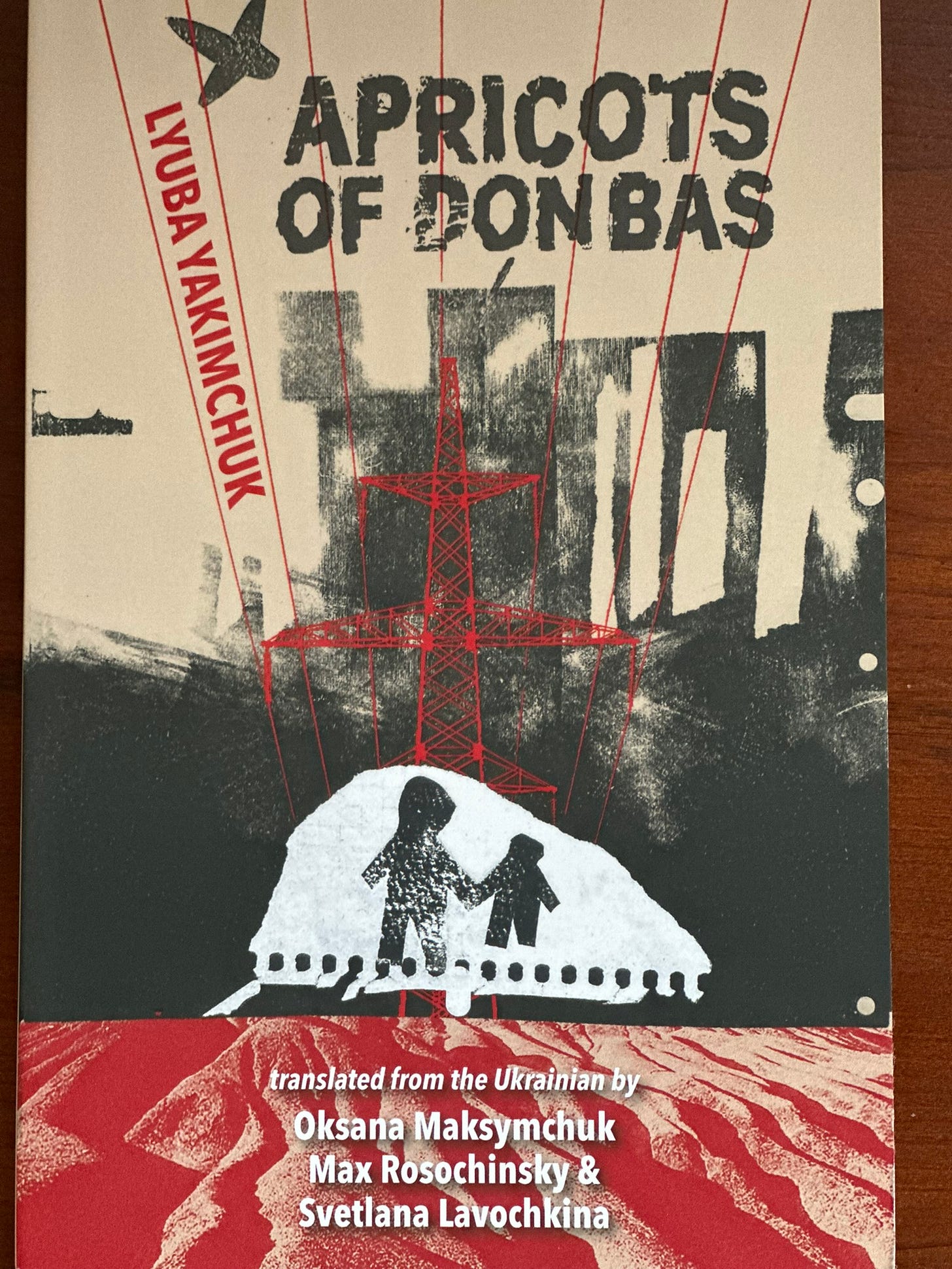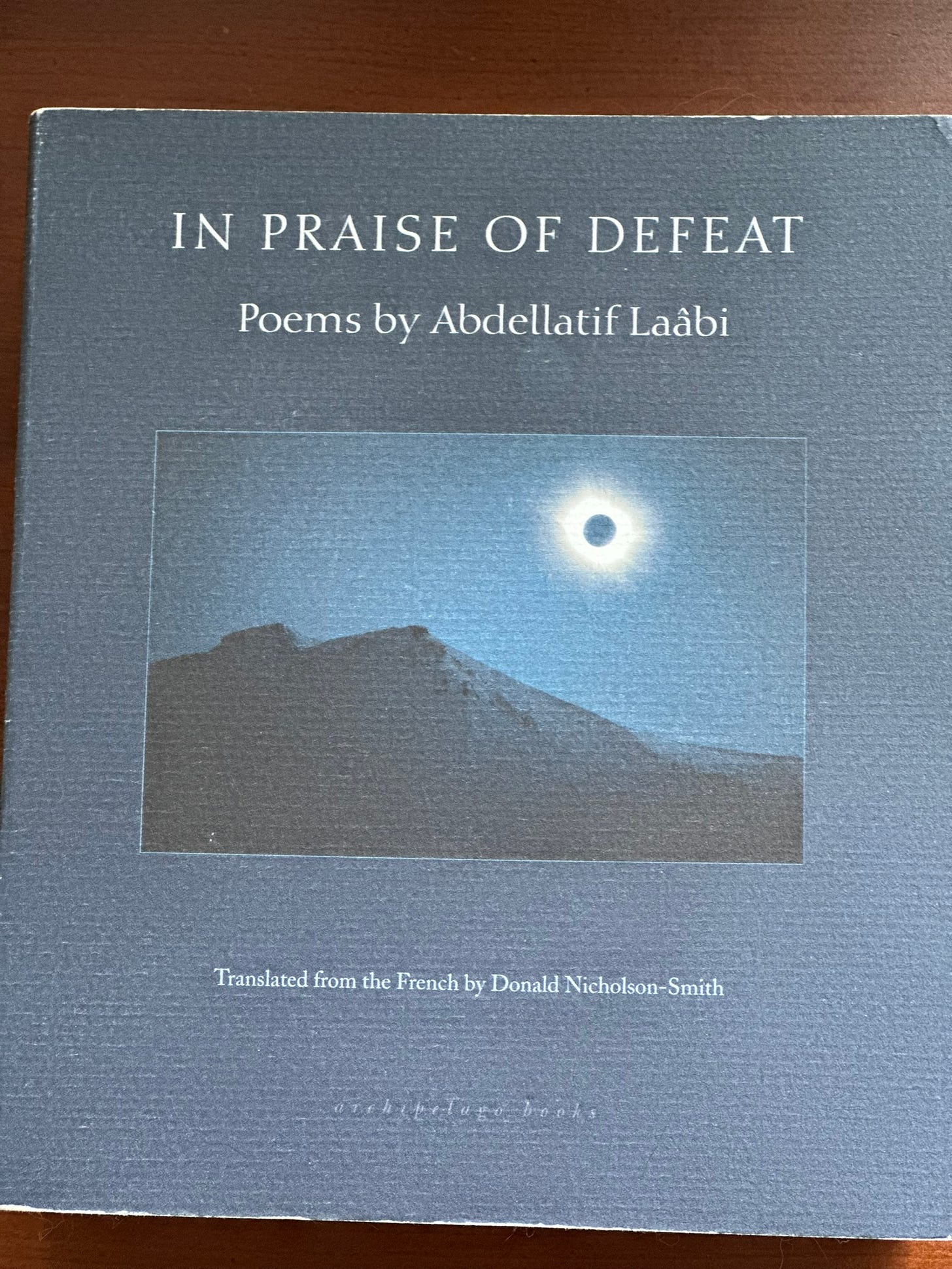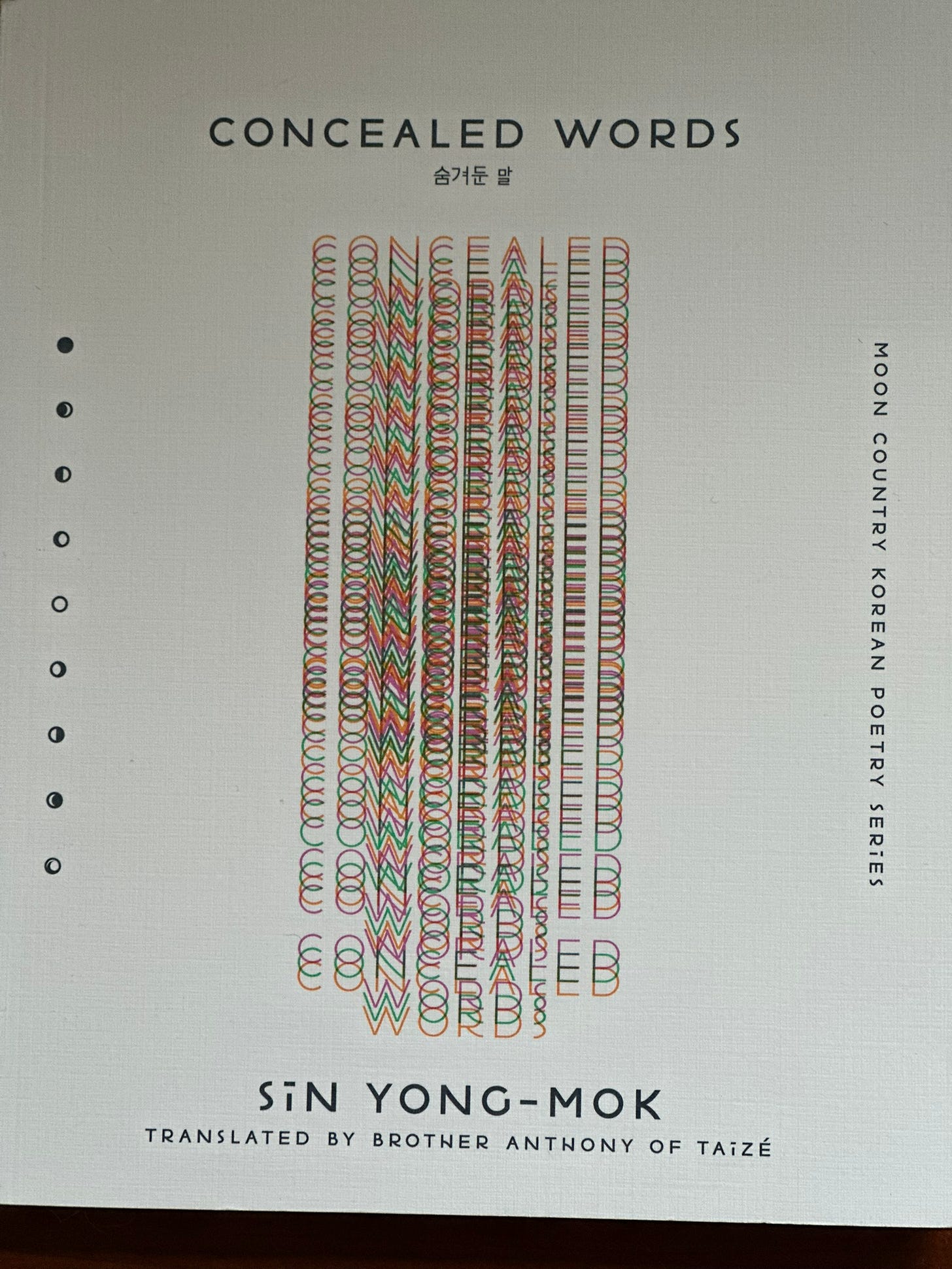Four Books, Four Presses, Four Countries, Six Translators
A survey, uniting threads, and notes on reading
My passion for translated literature and translated poetry is one of connection. I love the joy of being able to witness the journeys of other writers, readers, and minds through the choices made to translate, how much to translate, obsession with a singular author or providing something of a canon through your own efforts. Language is ever-shifting, of course, but in my mind translation is the closest act to capturing that present moment of the shift possible in literature.
Beyond my fixation and study of translation, I also genuinely love to experience new cultures and ideas through the lyric of such talented and unique writers. I love knowing about the sunflowers in Ukraine, I love reading about the omnipresent melancholic joys of Korea, I love learning about the nuance both in representation and perspective between South American countries (I understand this is a grossly simplified view of a massive historical and cultural variance), and I love writers who fearlessly express themselves in spite of authoritarian regimes and make the language of their oppressors into their tools for freedom.
Below you can read about a handful of works in translation I love, and their translators who I fear rarely get much of a spotlight shone on them.
Apricots of Donbas by Lyuba Yakimchuk tr. by Oksana Maksymchuk, Max Rosochinsky, and Svetlana Lavochkina published by Lost Horse Press
Before the poem is language, after all, what tends to the boundary of extra/ordinary more than language? I would be remiss to begin this reading without addressing an immense moment from Yakimchuk’s powerful essay beginning her collection, Reaching a Common Language, “In public, I speak exclusively Russian, not Ukrainian as I used to speak before the war. Now, the language one speaks is a marker, and I fear that I might be accused of collaborating with Ukrainian nationalist organizations, then sent “to the cellar”—an illegal prison indeed located in a cellar, where the captives are tortured.” One does not need to jump to borderline miraculous conclusions, does not need to celebrate the extraordinary depth of image or metaphor to appreciate the significance that reading even a sentence originally from the Ukrainian. This essay was written during the first Russian war starting in 2014, and now eleven years later we are in the midst of another Russian war on Ukraine. We (as in the United States) continue funding and promoting Russian literature and giving airtime to Russian-centric news coverage, and in our convenient distance make palatable the horrors of a thoroughly bombed and attacked country. The point in discussing Ukrainian poetry, and a point that Yakimchuk complicates and extends, is to make common Ukrainian existence so as to make Ukrainian existence unforgettable.
With three translators making this work possible, I’d like to give a highlight to each of their repertoires respectively. Oksana Maksymchuk has several translation credits of both individual poets and anthologized collections. Outside of Yakimchuk’s Apricots of Donbas I particularly recommend The Voices of Babim Yar to showcase the depth of scholarship and thoughtfulness her work offers. She also has a debut work of her own poetry that came out last May, 2024, Still Voices from Carcanet Press.
Max Rosochinsky and Maksymchuk have co-translated several projects including the above mentioned Voices of Babim Yar, as well as another individual collection of poems, Alex Averbuch’s Furious Harvests.
Svetlana Lvochkina joins Rosochinsky and Maksymchuk in the anthology of Ukrainian war poetry Words of War, and otherwise has a robust career of publishing and translating of her own right. Lovochkina has published Dam Duchess (Novelle) and Zap (Novel) with Whiskey Tit and Carbon. Songs of Crafts (Novel in verse) with Lost Horse Press. Her other translations include A Violin from the Other Riverside by Dmytro Kremin also from Lost Horse Press, as well as two additional anthologies - The White Chalk of Days and Quiet Spiders of the Hidden Soul.
I offer this spread of work as this opening segment to highlight how connective and far-reaching the act of translation can be both geographically and metaphysically. This is to speak nothing of the individual translations, of which clearly I appreciate the work enough to highlight these poems here and thereby also appreciate the translations within, but do carry marked differences between stylistic preferences on rigor-of-translation, verb-noun pair choices, and colloquialisms. I love works that can make me think so much on a page-by-page level.
In Praise of Defeat by Abdellatif Laâbi tr. by Donald Nicholson-Smith and published by Archipelago Books
A massive tome of almost twelve-hundred pages worth of poems and speeches and meditations drafted by a powerful writer and political prisoner. Truly to sit with this book is to know the patience of determination. That when one is truly right about their morals, their integrity, how the world must change for its people, there isn’t a prison of the mind that will last long enough to shift these perspectives. Instead, these poems offer a rare glimpse into the brilliance of Laâbi, everything of his grief and consideration, compassion and purpose. I read every single page and have absolutely no regrets.
I offer this review of In Praise of Defeat by the late an inimitable Pierre Joris:
He writes with a quiet, unassuming elegance that holds & hides the violence any act of creation proposes. Every creation is of course a breaking apart, a making of fragments, something Laâbi states ab initio in his poem “Forgotten Creation”: “In the beginning was the cry / and already discord.” Creating itself, the poem learns that “where nothing is born / nothing changes,” and that eternity is but “an impenetrable jar / no magic will open.” But the poem, Laâbi insists, will get us inside this act of imaginative creation. It is exactly the processual nature of his poetics, demanding a close listening to both inside and outside worlds, and the will and courage to follow changing meanders as the outside historical situation and the personal ecology of the poet’s world evolve, at times clash, but always inform—taking careful account of both the “in” and the “form” the word proposes—his work. Laâbi has been clear that his essential battle has been the one he fights against the hiatus between discourse and praxis, between thought and action, between the work—including that of poesis, of poetry—and the man: “For me ethics is the basis of politics as much as of literature or thinking.” It is this struggle, what he calls his “solitary-solidary struggle,” deeply committed, deeply political, yet situated outside any ideological system, a struggle toward the construction of an ethics able to equal the complexities of our world, that has been his compass. The rest is poetry.
From the perspective of this as a translation project, wow is all I really can say. Simply so much work to translate, ensuring some manner of correctness and managing to maintain proper tone throughout when on a line-by-line level phrases and sentences can shift from righteous indignation to grief to introspective meditations. Nicholson-Smith seems to truly embody a curiosity with his translation practices, as much of the work he’s translated does not stick to one genre, let alone singular authors. Other notable translation credits include authors like Guy Debord, Jean-Patrick Manchette, and Henri Lefebvre.
Concealed Words by Sin Yong Mok tr. by Brother Anthony of Taizé and published by Black Ocean Press
Everything I’ve read from the Black Ocean Press contemporary Korean Poets series has been tremendous, groundbreaking work full with meditative exercise, metaphysical wonder, and immense, surprising displays of fluid language. Sin Yong Mok’s Concealed Words tr. by Brother Anthony of Taizé continues this tradition in a dazzling fashion.
Brother Anthony is a tremendous and prolific translating figure, with some 59 poetry translations accredited thus far and an additional 12 fiction and 4 nonfiction works translated. His efforts began in 1988, and to single out works within this utmost generosity of a career would be nigh-impossible. Instead, I’ll offer some of his more voluminous authors translated are certainly Ko Un, Kim Seung-Hee, Jeong Ho-Seung, and Kim Kwang-Kyu. He has worked with some more than 30 unique presses, and is heavily awarded. It is this type of thoroughness of scholarship that I admire so deeply.
I offer excerpts from this interview from Brother Anthony as a note to his character, his passion:
Translation is complex operation, he said, because Korean poetry is written for Korean readers, and in a way reflects Koreans' relationship with their own language.
"The Korean poetry that a Korean poet writes is different from the way American or British poets write their poetries. Because Koreans are Koreans. The relationship that Koreans have with their language is not the same as that of Americans and British toward their languages," he said.
"It's about being Korean, with links to Korean psyche, which is a psyche of deep trauma, from history. The older generation knows it and the younger generation may not, but will more or less have inherited it."
In another interview with Chosun monthly magazine two years ago, Brother Anthony had said that Korean sentiment is the "heung (joy) in han (regret)," and "han in heung."
He believes that a good translation is one that readers don’t perceive as a translation.
"They read it as a poem or they read it as a novel — as an English poem or English novel," he said. "Koreans always say it has to be close to the original faithful translation. But readability is the only thing that counts. You want to it to be the same work novel or poem. Koreans like to say, 'Oh it's a mistake,' 'It's not relevant.' Readability is important."
To think critically, compassionately, and energetically about translation is, from what it seems to Brother Anthony, to truly know and recognize a culture. How that culture responds to language, and what that culture works language into are both necessary components to translation as a practice for understanding things outside of yourself.
midnight minutes by Víctor Rodríguez Núñez tr. Katherine M. Hedeen published by Carrion Bloom Books and Action Books
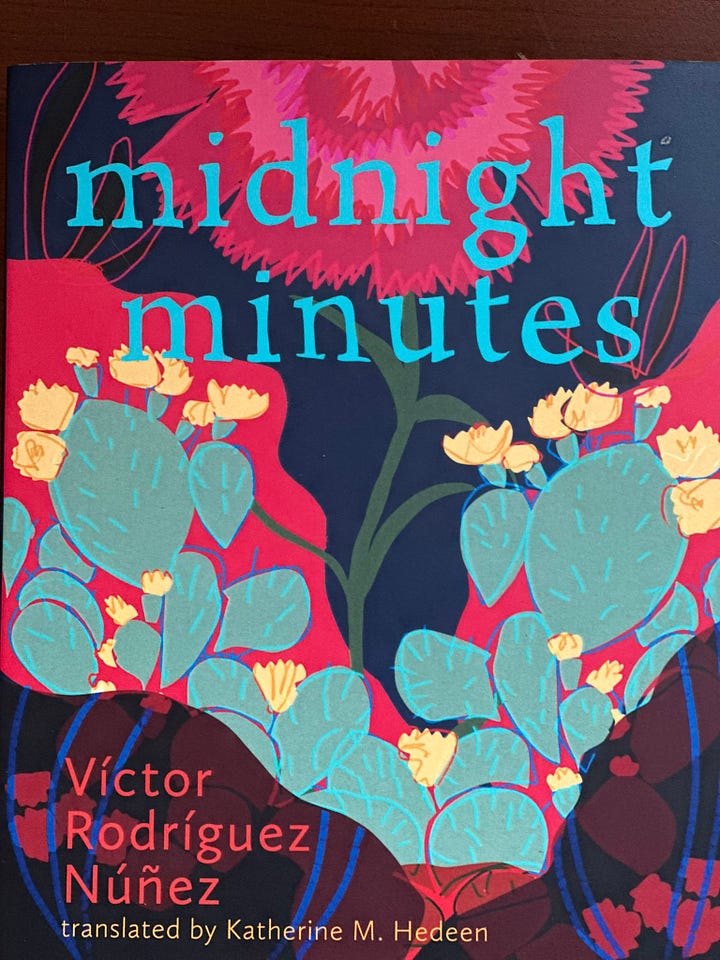
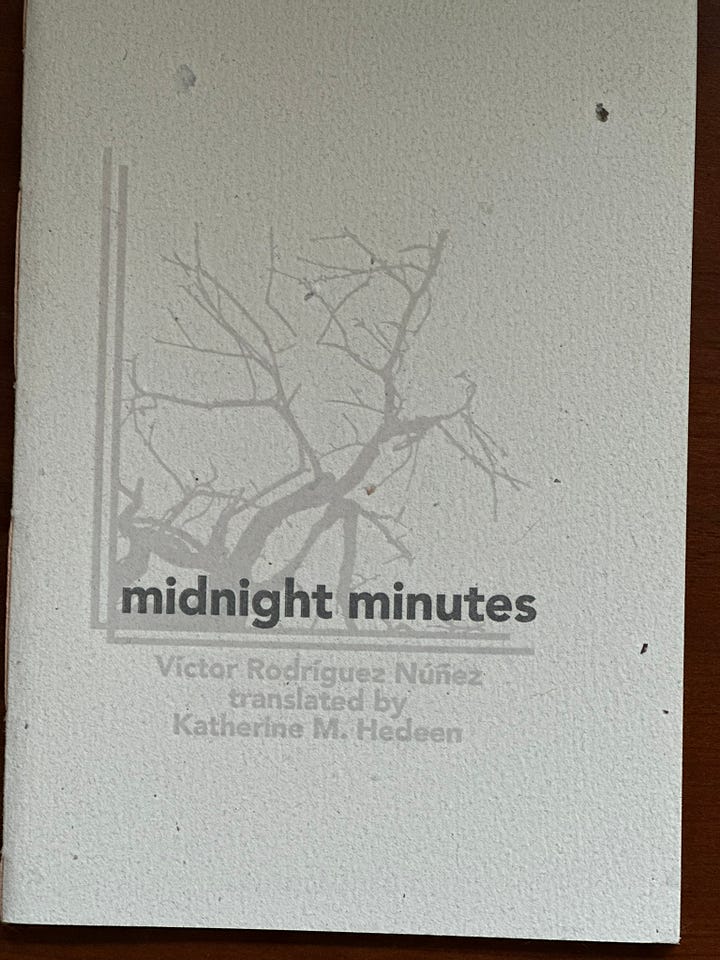
I’ve read two forms of this work midnight minutes by Víctor Rodríguez Núñez each translated by Katherine M. Hedeen. The first is a chapbook form of the work distributed by Carrion Bloom Books and perhaps one of my favorite textured and sized book-objects in my library. The second is a full-length collection published recently by Action Books.
Katherine M. Hedeen’s additional translation work resides in the form of some 30 translations from Spanish authors including additionally Jorgenrique Adoum, Juan Gelman, Ida Vitale, Juan Calzadilla, and Raúl Gómez Jattin into English, and an additional eleven from English into Spanish. But Hedeen’s particular focus certainly is on the work of Víctor Rodríguez Núñez. I love how she speaks of her relationship to the writing of Núñez in the following interview:
This book, written as we moved into a new century, signals a fundamental change in his poetics. In his earlier work, poems were topical, condensed bundles of (mostly) coherent meaning with a clearly developed beginning, middle, and end; a more conventional (acceptable?) approach to poetry. As you might guess, midnight minutes rejects this in favor of strangeness and sprawl. This is precisely why it’s my favorite book of his. As I have translated it, preserving the strangeness has been my biggest priority. The poem proposes its own different–and difficult–logic. My goal with the translation has been, both in terms of content as well as rhythm and flow, to defend its radical “irrationality.” For me, this is falling under the poem’s spell, losing control of it, letting it guide me. In more concrete terms, this might look like me, as a translator, refusing to impose a “rational” meaning on a word, phrase, or verse when there is none. Or, it might look like me, as a translator, replicating the creation of different meanings through the extensive use of enjambment.
The original book(s) (initially Rodríguez Núñez had divided the over 2000-line poem into two parts) were quite successful in Spain in the early 2000s, receiving prizes that ensured their publication. The book-length poem has now been published throughout Latin America as well, and individual cantos have been translated into various languages. We have been surprised at how well the poem has been received in the Spanish-speaking world. When it first came out, it was unlike any poetry that was being written at the time in Spanish. Not only did it signal a new poetic cycle for Rodríguez Núñez, it signaled one for Latin American poetry too. It was one of those situations where whether a reader loved it or hated it, they had to dialogue with it. actas (as we affectionately call it in Spanish) has also ushered in an incredibly prolific creative moment for Rodríguez Núñez, opening up so many ways to poetry.
I love the idea of translation as an act of falling under a poem’s spell. And perhaps this is a spell of its own - a spell in the midst of losing oneself through the connections one makes in uncovering the bridges for us all. A celebration as well as an admiration of the impeccable, novel, and important work these translators accomplish in introducing the work of so many treasured writers to the world.




